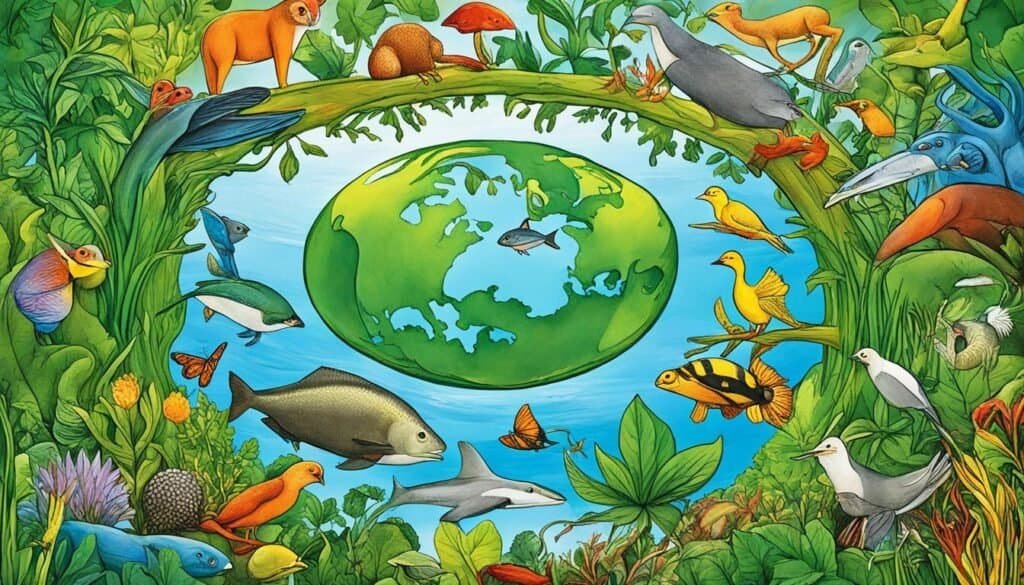Have you ever wondered what God said in the book of Genesis that still resonates with us today? Discover the Quotes from God in Genesis that offer profound insights into creation, humanity, and faith. These timeless words have the power to challenge our beliefs and provoke deep reflection.
From the divine command to “Let There Be Light” to God’s declaration of creating humanity in His own image, these quotes reveal the essence of our existence and the relationship between God and humanity.
What do these powerful quotes mean for us today? Join us as we dive into the transformative messages found in God’s words in Genesis and uncover the wisdom that has shaped our understanding of faith, purpose, and the human experience.
“Let There Be Light” (Genesis 1:3)
In the book of Genesis, the first words spoken by God hold immense significance and power: “Let there be light.” This simple yet profound statement serves as the foundation for the creation of the world as we know it. Light, in its essence, represents the divine energy and order that permeates every aspect of existence.
When God commanded the presence of light, He initiated the separation between darkness and illumination, signifying the emergence of life and the beginning of time. The beauty and brilliance of light bring clarity, revelation, and understanding to the world. It drives away shadows and reveals the wonders of creation.
The brilliance of God’s creation is captured in these words: “Let there be light.” This divine proclamation echoes with power and purpose, igniting the universe and setting the stage for the intricate tapestry of life to unfold.
The Symbolism of Light
Light, beyond its physical attributes, occupies a profound symbolic realm. It represents truth, knowledge, and enlightenment. God’s commandment to create light mirrors His desire to bring clarity and understanding to humanity. As light dispels darkness, so does divine wisdom guide us through the complexities of existence.
Light also embodies spiritual illumination and the presence of God. It serves as a beacon of hope, guiding us towards righteousness and leading us out of the depths of despair. In the light, we find comfort, reassurance, and the path to salvation.
Embracing the Light
As we reflect on the words “Let there be light,” we are invited to embrace the divine light within us and illuminate the world with goodness, love, and compassion. Just as light drives away darkness, we have the power to bring positive change and dispel the shadows that afflict our lives and communities.
Let us be the bearers of light, spreading kindness, understanding, and peace in a world that often feels consumed by darkness. As we strive to let our light shine, we align ourselves with the divine purpose for which we were created.
“Let Us Make Mankind in Our Image, in Our Likeness” (Genesis 1:26)
In the book of Genesis, God’s proclamation to create humanity in His image and likeness reveals the extraordinary relationship between the divine and human beings. This profound statement emphasizes the inherent value and dignity that each person possesses, reflecting the divine attributes bestowed upon them.
By creating mankind in His image, God infuses each individual with a unique reflection of His character, instilling qualities such as love, creativity, intelligence, and morality. This divine imprint sets humanity apart from the rest of creation, endowing them with a special purpose and identity.
“Let us make mankind in our image, in our likeness.”
This powerful verse from Genesis 1:26 signifies the intimate connection between God and humanity. It signifies that humans are not mere accidents or products of chance, but intentionally designed to reflect the glory and goodness of their Creator.
Through this divine image-bearing, human beings are called to exercise dominion over the earth responsibly, care for one another, and nurture relationships that mirror the love and grace of God. This concept affirms the inherent worth and potential of every person, highlighting the beauty and diversity found in the human race.
This image depicts the interplay between the divine and human, capturing the essence of God’s declaration in Genesis 1:26. It serves as a visual representation of the profound connection between God and humanity, portraying the distinctiveness and relational aspect of the image of God within each person.
The Significance of Being Created in God’s Image
Being created in the image of God invites individuals to recognize their intrinsic worth and potential, offering a framework for understanding their purpose and identity. It affirms the inherent value of every human life, transcending race, gender, or social status. This divine imprint unites all humanity under the common thread of shared dignity and points to the sacredness of every person.
The concept of being made in God’s image also calls individuals to honor and respect one another, recognizing the divinely bestowed value in every human being. It underlines the responsibility to promote justice, equality, and compassion, fostering a society that upholds the dignity and worth of all.
| Key Points | Implications |
|---|---|
| Human beings are created in the image of God. | Recognition of the inherent worth and dignity of every person. |
| Reflecting God’s character through love, creativity, and morality. | Exercising responsible dominion over the earth and caring for one another. |
| The image of God unifies humanity under shared dignity. | Promoting justice, equality, and compassion in society. |
“Be Fruitful and Increase in Number; Fill the Earth and Subdue It” (Genesis 1:28)
Genesis 1:28 introduces God’s commandment to humanity to be fruitful, increase in number, fill the earth, and subdue it. This powerful declaration emphasizes both our responsibility and our stewardship over the Earth.
As humans, we have been blessed with the ability to procreate and multiply. Our capacity to bring forth new life aligns with God’s original plan for creation. This commandment encourages us to embrace the beauty of reproduction and honor the sanctity of life.
“Be fruitful and increase in number; fill the earth and subdue it.”
In addition to multiplying, God calls us to steward the Earth. By subduing it, we are tasked with taking care of the world around us, using its resources wisely, and ensuring its sustainability for future generations.
This commandment holds profound ecological implications. It challenges us to strike a delicate balance between utilizing the Earth’s resources for our needs and conserving them for the benefit of all living beings. It is a call to practice responsible, sustainable living.
As we explore the depths of this commandment, let us reflect on our role as caretakers of the Earth. Let us ponder how we can fulfill this divine instruction in our everyday lives, making conscious choices that preserve the environment and honor the abundance of life that God has bestowed upon us.
Through our commitment to being fruitful and increasing in number, while simultaneously filling the earth and subduing it responsibly, we can embrace our role as faithful stewards of creation.
A Brief Summary:
God’s commandment to be fruitful and increase in number calls upon humanity to embrace the gift of procreation and the responsibility of bringing new life into the world. Additionally, we are called to subdue and steward the Earth, using its resources responsibly and practicing sustainable living.

| Key Points | Examples |
|---|---|
| Be fruitful and increase in number | – Celebrating the miracle of birth – Nurturing healthy relationships – Encouraging growth and development |
| Fill the earth | – Exploring new horizons – Expanding knowledge and understanding – Cultivating diverse cultures |
| Subdue the earth | – Practicing responsible resource management – Protecting the environment – Promoting sustainability |
“You Are Free to Eat from Any Tree in the Garden; But You Must Not Eat from the Tree of the Knowledge of Good and Evil” (Genesis 2:16-17)
Within the idyllic garden of Eden, God granted Adam and Eve incredible freedom. They were given permission to enjoy the abundance of nature, free to eat from any tree in the lush surroundings. This divine generosity displayed God’s love and provision for His creation.
However, alongside this freedom, God also established a boundary. He specifically commanded, “But you must not eat from the tree of the knowledge of good and evil.” This restriction introduced a test of obedience and demonstrated the importance of honoring God’s commands.
By placing the forbidden tree amidst the garden, God presented Adam and Eve with a choice. It was a test of their faithfulness and trust in His guidance. They were given the opportunity to exercise their free will while also reaffirming their reliance on God’s wisdom.
“You are free to eat from any tree in the garden; but you must not eat from the tree of the knowledge of good and evil, for when you eat from it you will certainly die.” (Genesis 2:16-17)
This warning held profound significance. God’s command conveyed the importance of recognizing the distinction between right and wrong, good and evil. It emphasized that true knowledge and understanding could only come from Him, the ultimate source of wisdom.
Tragically, as the story unfolds, Adam and Eve succumbed to temptation and disobeyed God’s decree. This act of disobedience shattered the perfection of the garden and introduced sin into the world, forever altering the course of human history.
Despite their disobedience, God’s warning serves as a reminder of the consequences of straying from His will. It stands as a powerful testament to the importance of obedience and the significance of God’s boundaries in our lives.
While the story of the forbidden fruit signifies humanity’s fall from grace, it also underscores God’s unwavering commitment to His creation. Even after the fall, God continued to extend His love, grace, and redemption to humanity throughout the pages of Scripture.
Image:
“It Is Not Good for the Man to Be Alone. I Will Make a Helper Suitable for Him” (Genesis 2:18)
In this section, we explore the profound statement made by God in Genesis 2:18 – “It is not good for the man to be alone. I will make a helper suitable for him.” This declaration by God highlights the importance of companionship and relationships in the life of humanity.
From the very beginning, God recognized that it is not good for man to exist in isolation. He understood the innate need within every individual for connection, support, and companionship. As a loving Creator, God took this realization into account and made a provision to fulfill this need.
God’s response to this realization was to create a helper suitable for Adam. He formed Eve, a companion who would walk alongside Adam, offering support, understanding, and partnership. This act exemplifies God’s deep care for His creation and His desire for humans to experience meaningful relationships.
Through the story of Adam and Eve, we learn that human beings are not meant to navigate life alone. We are wired for connection and community. We thrive when we have people around us who understand us, support us, and share our journey.
Adam’s need for companionship and God’s provision of a suitable helper serve as a reminder to all of us about the significance of relationships in our lives. Whether it is in our friendships, families, or romantic partnerships, genuine connections enrich our existence and help us grow.
Moreover, this biblical passage also reflects the value that God places on equality and partnership in relationships. Eve was created as a helper suitable for Adam, indicating that both men and women are equal in worth and significance. This equality forms the foundation for healthy, respectful, and fulfilling relationships.
God’s declaration in Genesis 2:18 echoes through the centuries, reminding us of the beauty and power of authentic relationships. It is a divine invitation to embrace companionship and build connections that bring joy, support, and growth to our lives.
As we journey through life, let us remember that God designed us to thrive in community. Let us cherish the relationships we have and seek to build new ones based on mutual love, respect, and support. In doing so, we honor the wisdom of God’s words in Genesis 2:18 and experience the fullness of life that comes from genuine connection.

| Benefits of Meaningful Relationships | Characteristics of Healthy Connections |
|---|---|
| – Emotional support during challenging times | – Mutual respect and equality |
| – Shared joys and celebrations | – Effective communication |
| – Opportunities for personal growth | – Trust and honesty |
| – Increased happiness and well-being | – Empathy and understanding |
| – Enhanced physical and mental health | – Supportive and nurturing environment |
Building and nurturing meaningful relationships takes effort and intentionality, but the rewards are immeasurable. By embracing the wisdom found in Genesis 2:18, we can cultivate deep connections that bring joy, fulfillment, and purpose to our lives.
“For Dust You Are and to Dust You Will Return” (Genesis 3:19)
After the fall of Adam and Eve, God addressed Adam, reminding him of his mortal origins and the consequences of sin. In Genesis 3:19, God proclaimed, “For dust you are and to dust you will return.”
This profound statement serves as a reminder of human fragility and the temporary nature of life on Earth. It emphasizes the significance of recognizing our mortality and the need for spiritual renewal.
As you ponder upon the words of Genesis 3:19, you are confronted with the stark realization that our physical existence is fleeting. From dust, we are formed, and to dust, we shall return. This reminder urges you to reflect on the brevity of life and the importance of living with purpose and righteousness.
Through this declaration, God highlights the consequences of sin and the imperative to seek redemption and spiritual growth. It prompts introspection and encourages a life lived in accordance with divine principles.
Furthermore, this scripture reminds us that our earthly existence is merely temporary, and our ultimate destiny lies beyond the confines of this mortal realm. It invites contemplation on the nature of the soul and the eternity that awaits beyond the constraints of time and physicality.
In the grand tapestry of the Book of Genesis, these words stand as a crucial reminder of humanity’s inherent fallibility and the call to strive for spiritual salvation. They echo through the ages, guiding us towards self-reflection and a deeper understanding of our place in God’s creation.

As you gaze upon the image above, let it serve as a visual representation of our transitory existence. Just as the sand slips through our fingers, so too does time. May it remind you of the fleeting nature of life and inspire a renewed commitment to live with purpose and meaning.
The Certainty of Mortality
Genesis 3:19 teaches us that mortality is an inescapable reality. No matter our station in life or worldly accomplishments, we are all bound by the inevitable return to dust. This truth compels us to contemplate the significance of our time on Earth and prioritize the pursuit of spiritual growth and righteousness.
| Key Reflections | Implications |
|---|---|
| We are reminded of the temporary nature of physical existence. | It prompts us to seize each moment and make the most of our time, focusing on what truly matters. |
| Mortality underscores the importance of spiritual renewal and growth. | We are inspired to cultivate virtues and align our lives with God’s teachings, seeking redemption and salvation. |
| Reflection on our mortality fosters gratitude for the gift of life. | We learn to appreciate the fleeting beauty and intricacies of the world around us, cherishing each day as a precious opportunity. |
As you reflect on these key insights, may you find solace in the knowledge that our earthly existence, though limited, holds profound potential for growth, connection, and spiritual transformation.
“Where Are You?” (Genesis 3:9)
After Adam and Eve sinned, they felt ashamed and hid from God in the garden. But God, in His infinite love and mercy, sought them out and called out to Adam, asking, “Where are you?” This divine inquiry reveals not only God’s omniscience but also His deep concern for His creation.
God’s gentle question, “Where are you?” demonstrates His desire for a restored relationship with humanity. Despite Adam and Eve’s disobedience, God’s pursuit of them reflects His unwavering love and longing to bring them back into communion with Him.
While God already knew exactly where Adam was physically located, His question was more than just a request for geographical information. It was an invitation for Adam to examine his own heart and acknowledge his separation from God due to sin.
In a similar way, God continues to ask us, “Where are you?” today. He invites us to reflect on our own spiritual condition and to recognize any areas where we may have distanced ourselves from Him. This introspection allows us to humbly come before Him, seeking forgiveness and restoration.
The inquiry “Where are you?” also serves as a reminder that God is always near, even when we feel lost or hidden. He patiently waits for us to turn back to Him, extending His grace and forgiveness. No matter how far we may have strayed, God’s love remains steadfast, ready to embrace us once again.

In the book of Genesis, God’s question “Where are you?” encapsulates His unfailing pursuit of His creation. It teaches us that God seeks to restore our relationship with Him, even in our moments of shame and disobedience. As we respond to His call, may we find solace in knowing that He is always with us, ready to guide and forgive.
“Cursed Is the Ground Because of You; Through Painful Toil You Will Eat Food from It All the Days of Your Life” (Genesis 3:17)
After Adam and Eve’s disobedience and the Fall, God pronounces a curse on the ground as a consequence of their actions. The ground, which was once a source of abundance and sustenance, is now cursed and will bring forth thorns and thistles. The idyllic harmony between humanity and the earth is disrupted, and painful toil becomes a necessary part of human existence.
“Cursed is the ground because of you.”
This curse signifies the broken relationship between humanity and the natural world. No longer will the earth easily yield its abundance. Instead, through painful toil, humans will have to labor in order to extract sustenance from the ground. The once effortless act of gathering food becomes a constant struggle, requiring immense effort and perseverance.
This curse represents not only physical labor but also toil in all aspects of life. The consequences of the Fall extend beyond agriculture to encompass the challenges and hardships that humans face in various endeavors. It is a reminder of the fallen nature of the world and the inherent difficulties that accompany human existence.
Despite the curse, humans continue to work the land, striving to provide for their needs and sustenance. This labor brings forth both the literal fruits of their toil and a deeper spiritual understanding of perseverance, resilience, and gratitude. It is a reminder of the consequences of disobedience, yet also a testament to human resilience and the potential for growth amidst adversity.
Striving and Nurturing the Earth: Overcoming Challenges
In their effort to overcome the challenges presented by the curse, humans continue to innovate and develop sustainable practices in agriculture and land management. With advancements in technology, irrigation systems, and crop cultivation techniques, the toil on the ground can be mitigated to some extent.
Furthermore, humanity’s responsibility to steward and care for the earth is emphasized in the face of the curse. Through sustainable farming practices, soil conservation, and environmental awareness, individuals and communities can help restore and nurture the land despite the challenges they face.
| Painful Toil | Cursed Ground | Perseverance |
|---|---|---|
| Physical labor required for sustenance | Thorns and thistles as a consequence | Resilience in the face of adversity |
| Challenges in various aspects of life | Struggle to obtain abundance from the land | Gratitude for the fruits of one’s labor |
| Adaptation and innovation in agriculture | Responsibility for stewardship of the earth | Restoration and nurturing of the land |
This curse on the ground serves as a constant reminder of our fallen nature and the challenges inherent in human existence. It calls us to recognize the importance of perseverance, ingenuity, and responsibility in our interaction with the earth. Through our toil and labor, we gain a deeper understanding of ourselves, the world around us, and our innate ability to overcome adversity and cultivate abundance.
What are some of the profound quotes from God in Genesis that reveal theological truths?
In Genesis, God reveals 10 profound theological truths through quotes such as “Let there be light” and “It is not good for man to be alone.” These statements highlight the power of God’s words and the importance of human companionship, illustrating foundational beliefs about creation and human relationships.
“I Have Set My Rainbow in the Clouds, and It Will Be the Sign of the Covenant between Me and the Earth” (Genesis 9:13)
As the story of Genesis unfolds, we witness God’s steadfast faithfulness and love for humanity. After the devastating flood that cleansed the earth, God made a promise—a covenant—to never destroy the world in the same way again. And to symbolize this covenant, God set His rainbow in the clouds as a sign of His unending love and faithfulness.
The rainbow is a beautiful and awe-inspiring phenomenon that has captivated humans for centuries. It serves as a reminder that even in the darkest of times, God remains a faithful and covenant-keeping God. The vibrant colors of the rainbow remind us of the richness of God’s promises and His unwavering commitment to His creation.
When we see a rainbow, we are reminded of God’s grace and mercy. It is a visual manifestation of His love and the reassurance that He will never abandon us. As we gaze upon the colors arcing across the sky, we are reminded to trust in God’s promises and to have hope in His faithfulness.
God’s promise, symbolized by the rainbow, extends far beyond the people of Noah’s time. It is a promise that encompasses all of humanity—past, present, and future. It is a promise that assures us that God’s love and protection endure against all odds. So, let us look up and marvel at the rainbow, remembering the covenant that God has set in the clouds, and have faith that He will always be with us, guiding us through the storms of life.
Affiliate Disclosure: "As an Amazon Associate I earn from qualifying purchases made from links in this post. We are a participant in the Amazon Services LLC Associates Program, an affiliate advertising program designed to provide a means for us to earn fees by linking to Amazon.com."

